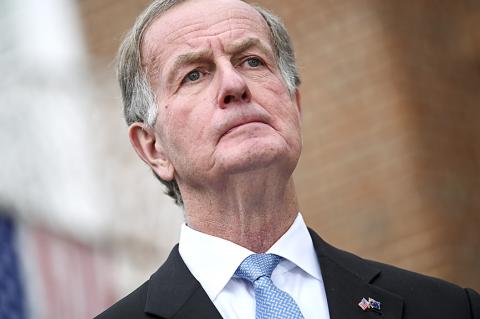Navigating China’s ever expanding influence, while decoding US President Donald Trump for a somewhat bemused and cynical audience, could be considered a big ask for a self-described “farm boy from Tennessee.”
However, Arthur Culvahouse, the new US ambassador to Australia, has hit the ground running, strengthening the US’ line against China’s soft diplomacy in the Pacific and declaring that the sheriff is back in town.
US Vice President Mike Pence has described Beijing’s loans to Pacific nations as “debt trap diplomacy.” Culvahouse, fresh from conversations on that topic with White House advisers, went further.

Photo: EPA-EFE
“I would use stronger language. I would use ‘payday loan diplomacy,’” he said in his first news conference in Australia, moments after presenting his credentials to the governor general.
“I think it is on us, all of the allies and the Western and liberal democracies, to educate people about the dangers of these loans — the fact that the money looks attractive and easy upfront, but you better read the fine print,” Culvahouse said.
“I think we have already have done a good job,” he added.
It is the line that he has been sent to deliver and the most candid that he was prepared to get.
Culvahouse might refer to himself as that long ago “farm boy,” but he first came to Washington’s notice as a staffer for former US senator Howard Baker, supporting the senator’s work on the committee looking into Watergate.
A career in law — including serving as counsel to former US president Ronald Reagan, a stint on the US Federal Advisory on Nuclear Failsafe and Risk Reduction and winning public service medals from both Reagan and former US vice president Dick Cheney for his efforts — has seemingly taught Culvahouse to think before he speaks.
It has been more than two years since the US has had a permanent ambassador to Australia, a fact that the US Department of State and Culvahouse were aware of, choosing to expedite his arrival following the announcement of his appointment in December last year.
US embassy staff and charge d’affaires James Carouso have held the line, keeping communication between Australia and one of its most important allies open, but Trump’s tweet diplomacy, growing tension over the US-China trade spat and China’s aggression in the South China Sea have meant that his permanent appointment was greeted with a diplomatic sigh of relief.
The message is that the US is back in town.
“We are a Pacific nation too,” Culvahouse said.

The US government has signed defense cooperation agreements with Japan and the Philippines to boost the deterrence capabilities of countries in the first island chain, a report by the National Security Bureau (NSB) showed. The main countries on the first island chain include the two nations and Taiwan. The bureau is to present the report at a meeting of the legislature’s Foreign Affairs and National Defense Committee tomorrow. The US military has deployed Typhon missile systems to Japan’s Yamaguchi Prefecture and Zambales province in the Philippines during their joint military exercises. It has also installed NMESIS anti-ship systems in Japan’s Okinawa

‘WIN-WIN’: The Philippines, and central and eastern European countries are important potential drone cooperation partners, Minister of Foreign Affairs Lin Chia-lung said Minister of Foreign Affairs Lin Chia-lung (林佳龍) in an interview published yesterday confirmed that there are joint ventures between Taiwan and Poland in the drone industry. Lin made the remark in an exclusive interview with the Chinese-language Liberty Times (the Taipei Times’ sister paper). The government-backed Taiwan Excellence Drone International Business Opportunities Alliance and the Polish Chamber of Unmanned Systems on Wednesday last week signed a memorandum of understanding in Poland to develop a “non-China” supply chain for drones and work together on key technologies. Asked if Taiwan prioritized Poland among central and eastern European countries in drone collaboration, Lin

The Chien Feng IV (勁蜂, Mighty Hornet) loitering munition is on track to enter flight tests next month in connection with potential adoption by Taiwanese and US armed forces, a government source said yesterday. The kamikaze drone, which boasts a range of 1,000km, debuted at the Taipei Aerospace and Defense Technology Exhibition in September, the official said on condition of anonymity. The Chungshan Institute of Science and Technology and US-based Kratos Defense jointly developed the platform by leveraging the engine and airframe of the latter’s MQM-178 Firejet target drone, they said. The uncrewed aerial vehicle is designed to utilize an artificial intelligence computer

Renewed border fighting between Thailand and Cambodia showed no signs of abating yesterday, leaving hundreds of thousands of displaced people in both countries living in strained conditions as more flooded into temporary shelters. Reporters on the Thai side of the border heard sounds of outgoing, indirect fire yesterday. About 400,000 people have been evacuated from affected areas in Thailand and about 700 schools closed while fighting was ongoing in four border provinces, said Thai Rear Admiral Surasant Kongsiri, a spokesman for the military. Cambodia evacuated more than 127,000 villagers and closed hundreds of schools, the Thai Ministry of Defense said. Thailand’s military announced that